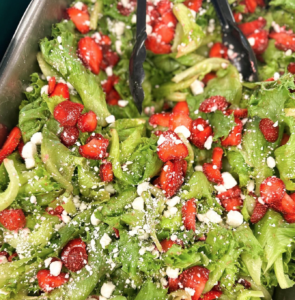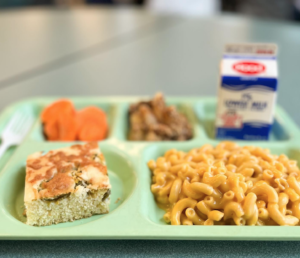This year, Mass. Farm to School is working in partnership with the Massachusetts Department of Elementary and Secondary Education to facilitate the Northeast Food for Schools (NFS) program, and will be sharing stories from program participants. We will be highlighting stories from both the school and vendor sides, and will discuss the impact this funding has had on communities across Massachusetts.
Northeast Food for Schools Participant: Greenfield Public Schools
Greta Shwachman, Food Service Director of Greenfield Public Schools, spoke with us about her experience with NFS funding, sourcing local dairy and other food items, and being creative while incorporating these items into the school menu.

Greenfield Public Schools, a district in Western Massachusetts serving 1400 students, was one of several districts who were able to pilot the NFS program at the end of the 2022-23 school year. The fact that Greenfield is a small district, Greta says, enables them to be flexible to try new recipes and ingredients. While Greta has had a lot of experience sourcing local, previously purchasing products from Joe Czajkowski Farm and Cabot Creamery, she was able to expand her local purchasing capabilities thanks to NFS funding. She used the funds to purchase milk, cheese, and yogurt from Cabot Creamery and Our Family Farms, sriracha sauce from Kitchen Garden Farms, green leaf lettuce from Little Leaf Farms, and corn tortillas from Mi Tierra Tortillas. These products were purchased either directly from the farm, or through local food hubs & distributors, such as Arnold’s Meats, Food Connects, and Marty’s Local.
 Greta was happy to have the opportunity to use local dairy when making chocolate pudding and macaroni and cheese. She used the tortillas to make baked tostadas, but says her recipe might need some tweaking to ensure the tortillas stay crispy throughout the lunch period! Due to the availability of the NFS funds, Greta felt more comfortable using her normal budget to purchase other more expensive products, such as, asparagus (to put in a quiche).
Greta was happy to have the opportunity to use local dairy when making chocolate pudding and macaroni and cheese. She used the tortillas to make baked tostadas, but says her recipe might need some tweaking to ensure the tortillas stay crispy throughout the lunch period! Due to the availability of the NFS funds, Greta felt more comfortable using her normal budget to purchase other more expensive products, such as, asparagus (to put in a quiche).
As the pilot program was only one month long, without intentional marketing and communication by Greta, the students may not have noticed the new local ingredients in their meals. Greta uses social media to communicate with students and families highlighting new recipes and local purchases. The students enjoyed many of the recipes incorporating local ingredients, such as, buffalo fish nuggets and smoothies and parfaits using local yogurt. Greta will has received good feedback from students and families about the meal program, and is planning on sending a survey at the start of the new school year to learn more about what students would like to see on the lunch menu and to learn more about their food values.
As the former Chicopee Public Schools Farm to School Coordinator, Greta has a long standing interest in incorporating Farm to School culture throughout her district. She believes its important to have buy-in from staff at all levels. She found that participating in the NFS program has helped bring more folks on board, as they’ve seen an increase in food quality.
In the future, Greta hopes to be able to purchase a hydroponic growing system, transition away from individual milk cartons to bulk milk to reduce waste and give kids more agency at mealtime, and is seeking grant funding to be able to purchase a flash freezer and vacuum sealer to preserve more food grown in Greenfield’s school gardens.
_________
Northeast Food for Schools (NFS) is a new, one time USDA funded program providing funds for schools to spend on locally sourced foods. The goal of the program is to strengthen the food system for schools by helping to build a fair, competitive, and resilient local food chain, and expand local and regional markets with an emphasis on purchasing from small and historically underserved producers and processors.NFS funds can be used to purchase a wide variety of products including produce, dairy, seafood, meat, and even grains. All foods must be unprocessed or minimally processed and grown/raised/caught within 400 miles.
Phone: (413) 253-3844
Email: info@massfarmtoschool.org